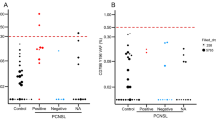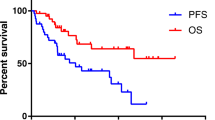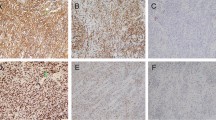Abstract
Bing–Neel syndrome (BNS) is a rare neurologic complication of lymphoplasmacytic lymphoma (LPL) characterized by direct infiltration of lymphoplasmacytic cells (LPCs). Although no standard treatment has yet been established, patients with BNS harboring the MYD88 L265P mutation have been reported to respond favorably to ibrutinib, which can cross the blood–brain barrier and trigger apoptosis of MYD88 L265P-positive LPCs. However, it is still unclear whether monitoring of MYD88 L265P mutation status would be useful for predicting relapse/progression or for assisting diagnosis and evaluating response to chemotherapy. Here, we report the case of a patient with BNS receiving ibrutinib in whom we detected relapse early by monitoring for molecular residual disease (MRD) based on the presence of the MYD88 L265P mutation in cerebrospinal fluid (CSF) on droplet digital polymerase chain reaction assay. Persistent MRD increased 2 weeks before the onset of relapse symptoms without any abnormal imaging findings or evidence of clonal LPCs on CSF cytology, flow cytometry analysis, or immunofixation electrophoresis. Our findings suggest that an increase in MRD levels is correlated with relapse in patients with BNS.




Similar content being viewed by others
References
Castillo JJ, Treon SP. How we manage Bing–Neel syndrome. Br J Haematol. 2019;187:277–85.
Minnema MC, Kimby E, D’Sa S, Fornecker LM, Poulain S, Snijders TJ, et al. Guideline for the diagnosis, treatment and response criteria for Bing–Neel syndrome. Haematologica. 2017;102:43–51.
Nagao T, Oshikawa G, Ishida S, Akiyama H, Umezawa Y, Nogami A, et al. A novel myd88 mutation, l265r pp, in waldenström macroglobulinemia activates the nf-κb pathway to upregulate bcl-xl expression and enhances cell survival. Blood Cancer J. 2015;5:e314.
Herman SE, Mustafa RZ, Gyamfi JA, Pittaluga S, Chang S, Chang B, et al. Ibrutinib inhibits bcr and nf-κb signaling and reduces tumor proliferation in tissue-resident cells of patients with cll. Blood. 2014;123:3286–95.
Dimopoulos MA, Tedeschi A, Trotman J, García-Sanz R, Macdonald D, Leblond V, et al. Phase 3 trial of ibrutinib plus rituximab in waldenström’s macroglobulinemia. N Engl J Med. 2018;378:2399–410.
Dimopoulos MA, Trotman J, Tedeschi A, Matous JV, Macdonald D, Tam C, et al. Ibrutinib for patients with rituximab-refractory waldenström’s macroglobulinaemia (innovate): an open-label substudy of an international, multicentre, phase 3 trial. Lancet Oncol. 2017;18:241–50.
Castillo JJ, Itchaki G, Paludo J, Varettoni M, Buske C, Eyre TA, et al. Ibrutinib for the treatment of Bing–Neel syndrome: a multicenter study. Blood. 2019;133:299–305.
Mason C, Savona S, Rini JN, Castillo JJ, Xu L, Hunter ZR, et al. Ibrutinib penetrates the blood brain barrier and shows efficacy in the therapy of bing neel syndrome. Br J Haematol. 2017;179:339–41.
Hattori K, Sakata-Yanagimoto M, Suehara Y, Yokoyama Y, Kato T, Kurita N, et al. Clinical significance of disease-specific myd88 mutations in circulating DNA in primary central nervous system lymphoma. Cancer Sci. 2018;109:225–30.
Drandi D, Genuardi E, Dogliotti I, Ferrante M, Jiménez C, Guerrini F, et al. Highly sensitive myd88 (l265p) mutation detection by droplet digital polymerase chain reaction in waldenström macroglobulinemia. Haematologica. 2018;103:1029–37.
Kapoor P, Ansell SM, Fonseca R, Chanan-Khan A, Kyle RA, Kumar SK, et al. Diagnosis and management of waldenström macroglobulinemia: mayo stratification of macroglobulinemia and risk-adapted therapy (msmart) guidelines 2016. JAMA Oncol. 2017;3:1257–65.
Poulain S, Boyle EM, Roumier C, Demarquette H, Wemeau M, Geffroy S, et al. Myd88 l265p mutation contributes to the diagnosis of bing neel syndrome. Br J Haematol. 2014;167:506–13.
Frustaci AM, Rusconi C, Picardi P, Veronese S, Montillo M, Cairoli R, et al. Bing neel syndrome in a previously untreated patient with waldenström’s macroglobulinemia: contribution of myd88 l265p mutation on cerebrospinal fluid. Clin Lymphoma Myeloma Leuk. 2016;16:e7-9.
Bobillo S, Crespo M, Escudero L, Mayor R, Raheja P, Carpio C, et al. Cell free circulating tumor DNA in cerebrospinal fluid detects and monitors central nervous system involvement of B-cell lymphomas. Haematologica. 2020. https://doi.org/10.3324/haematol.2019.241208 ([published online ahead of print February 20, 2020]).
Hiemcke-Jiwa LS, Leguit RJ, Radersma-van Loon JH, Westerweel PE, Rood JJM, Doorduijn JK, et al. Efficacy of ibrutinib in a patient with transformed lymphoplasmacytic lymphoma and central nervous system involvement. Leuk Lymphoma. 2018;59:1256–9.
Gustine JN, Meid K, Dubeau T, Severns P, Hunter ZR, Guang Y, et al. Ibrutinib discontinuation in waldenström macroglobulinemia: etiologies, outcomes, and igm rebound. Am J Hematol. 2018;93:511–7.
Treon SP, Gustine J, Meid K, Yang G, Xu L, Liu X, et al. Ibrutinib monotherapy in symptomatic, treatment-naïve patients with waldenström macroglobulinemia. J Clin Oncol. 2018;36:2755–61.
Author information
Authors and Affiliations
Corresponding author
Ethics declarations
Conflict of interest
The authors have no conflicts of interest to declare.
Ethical approval
Off-label use of ibrutinib for this patient with BNS was approved by the Institutional Review Board of Uwajima City Hospital (IRB number: 1911-262). Written informed consent was also obtained from the patient for off-label use.
Additional information
Publisher's Note
Springer Nature remains neutral with regard to jurisdictional claims in published maps and institutional affiliations.
About this article
Cite this article
Shikata, H., Kihara, H., Kaneko, M. et al. Monitoring of MYD88 L265P mutation by droplet digital polymerase chain reaction for prediction of early relapse in a patient with Bing–Neel syndrome. Int J Hematol 113, 586–591 (2021). https://doi.org/10.1007/s12185-020-03038-x
Received:
Revised:
Accepted:
Published:
Issue Date:
DOI: https://doi.org/10.1007/s12185-020-03038-x




